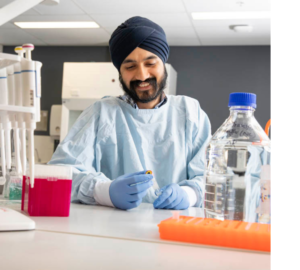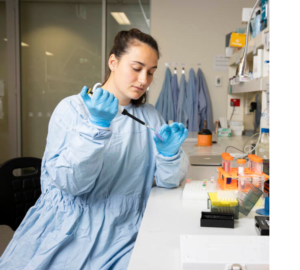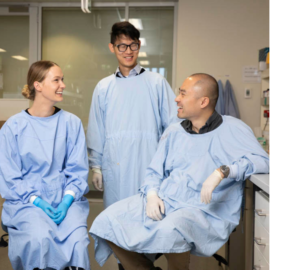You can help us reduce the global prevalence of Chronic Kidney Disease and improve patient outcomes.
Research highlight
Treatment
- Developing a new anti-body based treatment using nano (shark) antibodies.
- Using these antibodies to block CXCR4 which can cause kidney inflammation and CKD.
- These antibodies have shown promising results in preventing the development of kidney disease.
Research highlight
Therapy
- New research involving the deletion implicated in the development of kidney disease.
- CRISPR-Cas9 technology allows us to remove, add or alter sections of the DNA sequence.
- We currently have two gene therapy targets in development.
Research highlight
- Kidney organoids have emerged as advanced in vitro models of kidney development, physiology and disease for research.
- Current conventional research models, such as static cell cultures and animal models are insufficient to reflect the complexities of CKD.
Why support our renal disease research?
The global prevalence of Chronic Kidney Disease (CKD) continues to increase with over 843 million people affected today.
In Australia, CKD affects 1.7 million people in our community – but a staggering 1.5 million are not even aware they have it.
The renal research team’s overarching goal is to improve the lives of patients with CKD.
We are working to achieve this by:
- Generating new knowledge about the cause of progressive kidney disease
- Developing new diagnostic tests to predict those who will develop kidney failure
- Discovering new medicines to prevent and treat kidney disease
- Applying our discoveries to human clinical trials
- Bringing new tests and therapies to market with our industry colleagues

Your donations will provide crucial funding necessary for furthering our research efforts and translating it into clinical practice to improve outcomes for patients.
Research areas of strength

Our renal research team collaborates internationally, with pharmaceutical companies and smaller Australian biotech companies to transfer their research into clinical practice. Currently they are involved in a number clinical trials investigating chronic kidney disease, dialysis and transplantation including:
- Targeting inflammatory pathways known to be upregulated in kidney disease
- Limiting kidney scarring in models of transplantation to ensure longevity of transplant kidney function
- Non-invasive determination of patients at risk of progressive diabetic/non-diabetic kidney disease
- Prevention of chronic kidney disease though limiting transmission of maternal to foetal risk of chronic kidney disease
- Fibre supplements to improve glycaemic control and reduce chronic kidney disease
- Normalising the function of the mitochondria in progressive chronic kidney disease
- Development of therapeutics against promising targets in chronic kidney disease
- Diabetic kidney disease-early detection and potential treatment

The Royal North Shore Hospital Renal Clinical Trial Unit has a strong research history, participating in Phase 2 to Phase 4 clinical research for more than 20 years.
The Renal Clinical Trial Unit is led by a clinician supported by two full time trial coordinators and a part time research associate.
At any given time, our team coordinates 15 to 25 investigator-initiated or industry sponsored clinical trials, while also working in a busy clinical environment caring for patients with kidney diseases.

Some examples of clinical trials currently taking place:
- TRACK: Treatment of cardiovascular disease with low dose rivaroxaban in advanced CKD
- CARSK: Screening for asymptomatic coronary artery disease in kidney transplant candidates populations
- REDUCCTION: Reducing the burden of dialysis catheter complications in patients with kidney disease
- CLARITY: Controlled evaluation of angiotensin receptor blockers for COVID-19 respiratory disease
Introducing some of the Renal Research team
Professor Carol Pollock
Renal Research Lead at the Kolling Institute
Associate Professor Xin-Ming Chen
Associate Professor Sonia Saad
Associate Professor Sarah Glastras
Peter (Ji) Bian
Umut Rende
Dr Natassia M Antoinette Rodrigo
Dr Eveline Staub
Dr Long The Nguyen
Which area would you like to support?
How much would you like to donate?
Your Details

